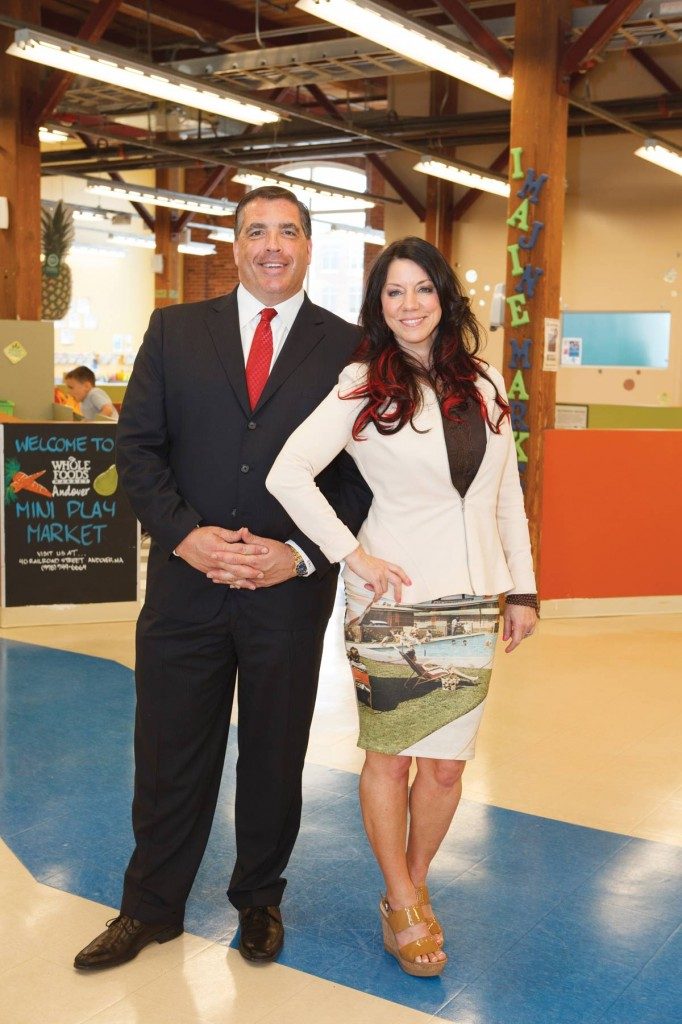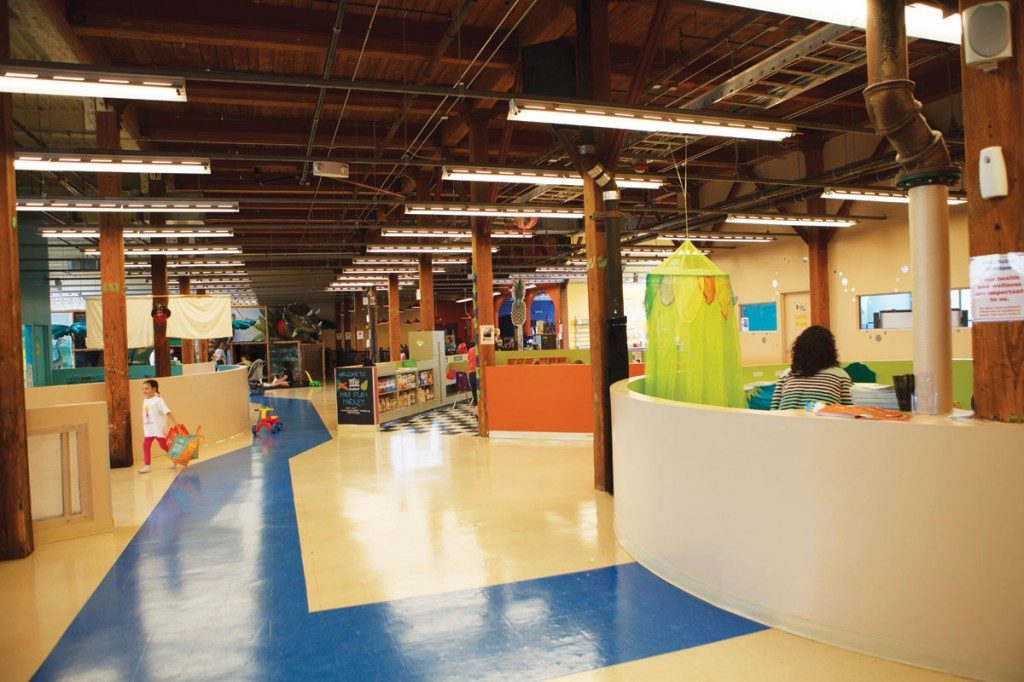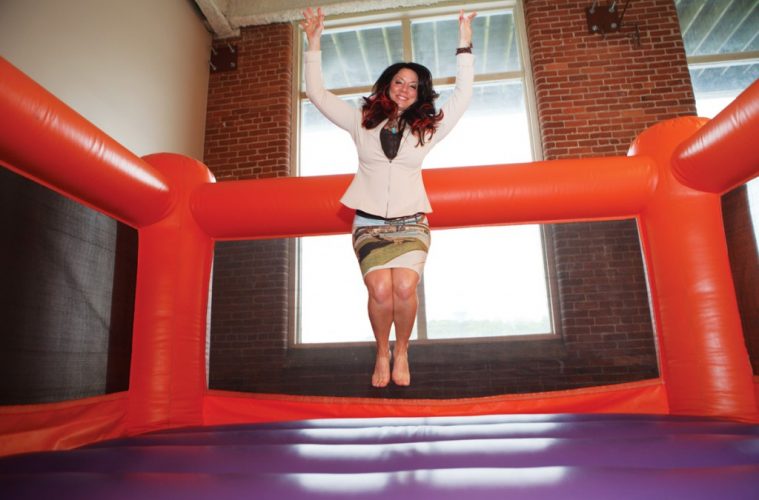Two North Shore institutions team up to give families a place to learn, bond, and be carefree.
Under the high, vaulted ceilings of a painstakingly renovated mill, a sock-footed little girl is grocery shopping. She’s pushing a miniature grocery cart through a pretend Whole Foods Market, loading it up with plastic oranges, bananas, peppers, and pears, ready to go through the check-out line with her little reusable shopping bag in tow. Behind her, signs outlining the “4 Pillars of Healthy Eating” hang on the wall. She can’t read yet, but her mother can. As Mom punches numbers into the pretend cash register, her eyes linger over the messages on the signs. Maybe Mom’s thinking about dinner tonight, about making sure the pasta she was planning to cook is made with whole wheat and thinking of ways to get a few extra veggies onto her daughter’s plate.
When kids come to Imajine That at Lawrence’s Riverwalk, they just want to play. But Imajine That founder and president Susan Leger Ferraro hopes children and parents get a lot more out of the experience than that. She describes Imajine That as an “interactive family engagement location” where kids and parents can not only have fun, but also learn about reading, science, music, and art while they’re at it.
“Families actually learn better in an informal setting, like a children’s museum or a playspace like [where] we are,” she says. “Our heart’s desire, our mission, is about creating better families…it’s about family engagement through play.”
Now, Imajine That is adding healthy eating and nutrition to its learning-through-play model. Leger Ferraro is teaming with Sal’s Pizza owner Salvatore Lupoli for Little Sal’s Culinary Institute, which is opening in Imajine That late this summer with a focus on educating families about cooking and healthy eating.
Leger Ferraro seems to have found a kindred spirit in Salvatore Lupoli. Both are successful, self-made entrepreneurs: Before starting Imajine That, Leger Ferraro founded Little Sprouts, a network of early education centers; Lupoli is the owner of Sal’s Pizza, Salvatore’s Restaurants, Riverwalk Properties, and Phoodeez.com. “When people like Susan Leger Ferraro and Sal Lupoli get in a room,” Lupoli says, “we’re bound to be drawn to each other because of our creative and innovative ideas.”
Imajine That was among the first businesses in Riverwalk Properties, which consisted of dilapidated mill buildings before Lupoli bought and renovated them in the mid-2000s. Today, Riverwalk consists of almost 2.5 million square feet of space and is home to more than 200 companies and about 4,000 employees.
Riverwalk might be successful now, but Lupoli was met with skepticism when he first began the project nearly a decade ago. “Unfortunately, we had a ZIP code problem,” he admits. That ZIP code? 01843: Lawrence. Even with the triumph of Riverwalk, Lawrence carries a stigma that’s hard to shake.

Lupoli and Leger Ferraro at Imajine That, Lawrence.
According to 2009 data from the Massachusetts Executive Office of Public Safety and Security, Lawrence was among the 10 cities in Massachusetts with the highest rate of violent crime. The city’s per capita income is less than $13,000, according to the Department of Revenue. Data from the 2010 census shows that from 2007-2011, more than 28 percent of its population lived below the poverty level. Census data also shows a population that’s more than 73 percent Hispanic or Latino.
“[Lawrence] was the symbol of blight. This was a place where people were told not to go, because of what? Because of a perceived history of Lawrence,” Lupoli says. “In order to move forward, [the city] has to understand its mistakes. But…history belongs right where it is, in the past. And if everyone believed in the history, then no one would move forward, there would be no innovative ideas.”
So when Leger Ferraro proposed adding Imajine That to Riverwalk, Lupoli not only saw an opportunity for both companies, but also for the city itself. “The thought of little children and their parents coming into Imajine That would help ease or break that stigma that people have,” Lupoli says. “How can this be such a bad place if there are children here and they’re having the best time in the world?”
Today, that fear seems nonexistent for parents who eagerly bring their children to Imajine That. Leger Ferraro says Imajine That has 17,000 members and tracks between 4,000 and 5,000 in foot traffic per month. The space has nine different play stations, including a “Peep and the Big Wide World” science station and a “Between the Lions” literacy station, which are sponsored through a partnership with WGBH. Another partner is Whole Foods Andover, which recently sponsored a nutrition-focused revamp of Imajine That’s pretend grocery store. The play space also hosts classes and workshops for parents and children, teaching everything from dance, to music, to karate, to jewelry and paper craft making.
Add cooking and nutrition to that list. Anyone who walks into Imajine That can’t help but notice that it’s located a floor above Salvatore’s Restaurant, and the little Imajine That cafe has been serving Sal’s Pizza to hungry visitors for some time.
Given the proximity of the two companies, Leger Ferraro says she and Lupoli began to explore ways to make the partnership between them more formalized. She discovered that Lupoli wanted to teach little kids how to make pizza with an eye toward also educating parents and families about good nutrition and healthy eating. “That’s something near and dear to Sal’s heart,” Leger Ferraro says, adding that Lupoli, who is now a partner in Imajine That, is passionate about education, nutrition, and community involvement.
“In addition to creating a Sal’s Culinary Institute, what things can we pass onto the community?” Lupoli says. With that in mind, the cooking classes and workshops will consist of more than just kids making pizza, but also teaching them where fruits and vegetables come from; the nutritional value of the ingredients; and the food safety component of cooking. “It’s really all about family engagement,” Lupoli adds.
The idea of family engagement is an important one, going back to Leger Ferraro’s point that the best way to teach parents and kids is through active engagement in informal settings, rather than in static classes or workshops. “This is all hands on,” Leger Ferraro says. “Everything that we do at Imajine That is hands on.”
Moreover, this active, family-centered approach to healthy eating and cooking is actually recommended by the American Heart Association for obesity prevention in children and adolescents. In fact, the AHA’s scientific statement on the subject calls for “reducing the number of meals eaten outside the home,” eating meals as a family, and “involving children in meal planning, shopping, gardening, and preparation of food.”

Imagine That’s play area.
“There’s a whole initiative and a movement toward being home. It’s because of nutrition, but it’s also because of the cultural, familial values that it brings to our communities and to our families and to our kids,” Leger Ferraro says. She notes that when kids spend time at the family table, they’re healthier in every way: physically, socially, and emotionally. “That is just as important, and just as important to us,” she explains. Such education is also critical to Lawrence and its largely Hispanic population. Data from the US Department of Health and Human Services shows that obesity and diabetes rates are higher among Hispanics.
After closing for a week in August for construction, Imajine That will reopen with a revamped and expanded cafe, as well as a style room with a kitchen area and space where kids and parents can work and take cooking classes. class-In any pizza shop, “you look behind the counter, and there’s a chef with a chef’s hat on, lab coat; he’s mixing a homemade sauce, grinding the cheese, stretching the dough,” Lupoli says. “Imagine that taking place when you walk into a Sal’s Culinary Institute. However, instead of a chef there’s a facilitator and a child that’s learning all those components.”
Cooking classes will be offered in both multi-class blocks and drop-in sessions because Imajine That wants “to be able to meet parents where they are,” Leger Ferraro says, pointing out that not every parent has the ability or resources to enroll their child in a multi-week session. The schedule for drop-in classes will be noted each day on a dry erase board near the entrance, and loudspeaker announcements will invite visitors to participate before classes begin.
Leger Ferraro says the Little Sal’s Culinary Institute is just the beginning of Imajine That’s expansion. In addition to the main location in Lawrence, Imajine That also has “pop-up” locations in several Boston public schools and will be in Lawrence public schools this fall. The partners are also working with community centers and children’s museums, and they are in talks with schools systems in three other states.
“We’re actually adding value to current systems that are already in place for children and families,” Leger Ferraro says. “Our vision for this is to take it national.” And as Imajine That goes national, so will Lawrence, the city where it began.
“It’s the symbol of not blight, but it’s the symbol of opportunity; it’s the symbol of inspiration,” Lupoli says. “It’s the symbol of really what it’s all about, which is change.” imajinethat.com; lupolicompanies.com

